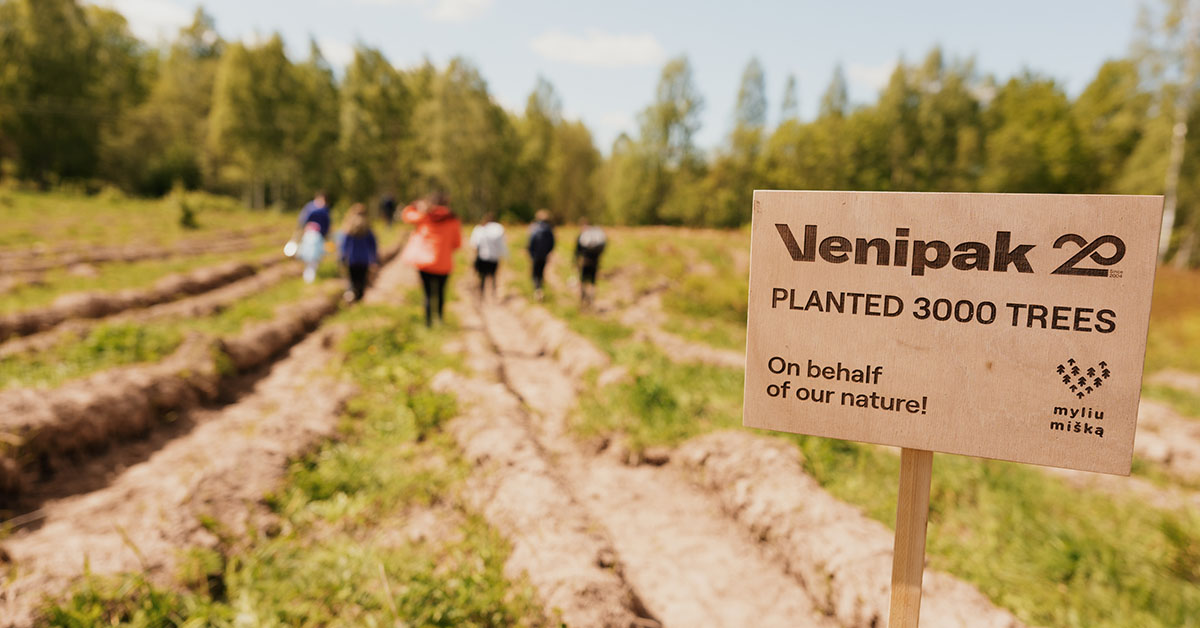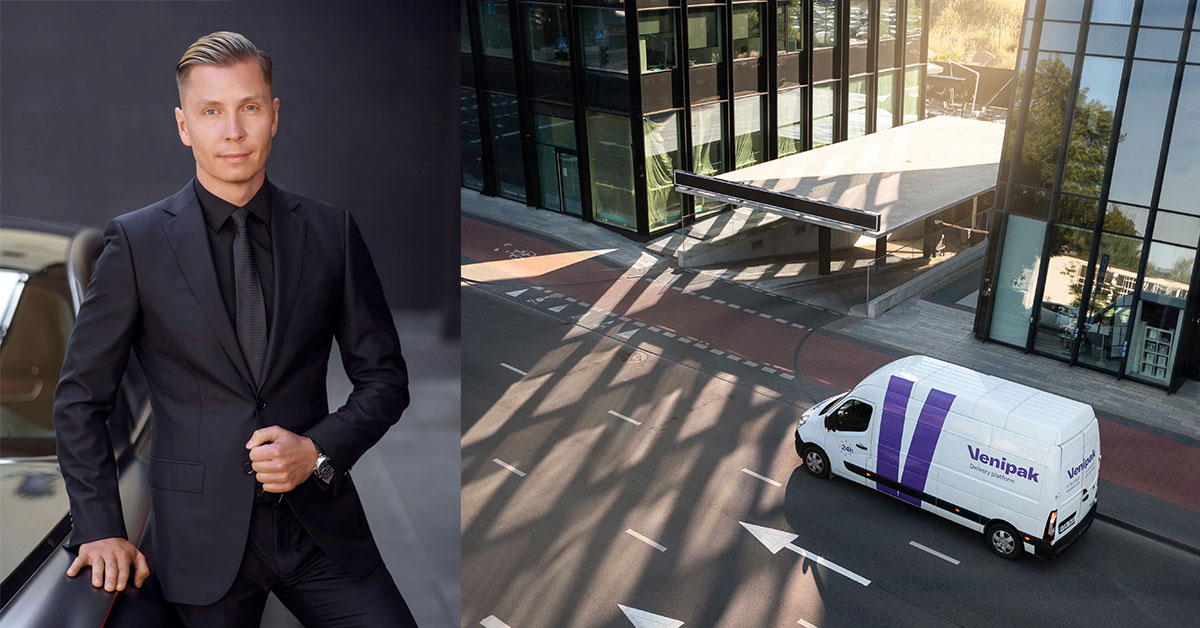“I’ve been very lucky to create a structure in the company where every professional in their field is head and shoulders above me,” says Nerijus Raudonis, the founder and sole shareholder of Venipak, an international parcel delivery company. The business that started 20 years ago has today grown into an international company that not only provides parcel delivery services in the Baltic States, but is also creating an ecosystem for e-commerce businesses that seek to strengthen their position in the global market.
“I have probably been in business since I was around 20, and I have never taken short-term speculations,” says Raudonis. “I grew up in an environment where long-term values predominated. I was taught that if you are doing something, do it well, if you are buying, choose a good thing, and if you are creating, create long-term rather than short-term solutions.”
His first business was a video rental chain – the young entrepreneur was running about 100 video rental outlets, which subsequently closed as the need for video rentals plummeted at the dawn of the internet.
Business plan on a napkin
Raudonis says that his interest in the parcel and logistics sector was sparked by a friend who worked for an international parcel delivery company. “I monitored his involvement in this sector for several years. At that time, such a business seemed unachievable, but apparently something clicked in our subconscious minds so in a café we took a napkin and drew a diagram of how it could be. Back then, there was no IT, no scanners, no documents or contracts – nothing to control the process or track deliveries,” he recalls.
He adds that there was no fear either, just a desire to move forward. So after selling the video rental outlets and borrowing money from the bank, the decision was made to start. “The competition was small, just a few players, so it seemed it would be a piece of cake, but it wasn’t – we had to overcome a lot of challenges to get to where we are today.”
Parcel company starts as flour delivery business
He remembers that the first steps in logistics were really difficult – there was a shortage of cars and warehouses, and there were only three couriers, who used to start work at 4am and deliver parcels all over the country, not to mention the challenges of building the logistics network, preparing the commercial offer, creating the logo, and all the other prerequisite business issues that had to be performed by just a few people.
“I worked as an accountant, warehouseman and driver, but no matter how hard I tried to sell the service, no one needed us. E-commerce didn’t exist yet, and the big companies we were targeting kept telling us that we had to grow.”
One day, his colleague found some customers delivering flour for bakers. “We had to deliver a certain amount of flour,” he says, “and this motivated us to move forward with formal documentation – our first consignment note was issued for these consignments.”
The company’s first regular customer then soon appeared, and Nerijus established a network of independent couriers. “That’s how I worked 16–18 hours a day for a few years, with just a little bit of sleep.”
Opportunities borne from crisis
In 2006, the company, with no idea yet about the future of the cloud, already had an IT system – an application that could be accessed remotely to fill orders, track deliveries, print consignment notes, and apply stickers to boxes. Such system was necessary to deal with the steady flow of parcels rather than ad hoc orders.
The 2008 crisis brought new opportunities. “When everyone was saving money and looking for ways to survive in a slow economy, we found a niche – customers who could economise by outsourcing logistics. And it worked – we gained momentum in Lithuania, entered Latvia in 2010, and Estonia a year later. It took us a long time to break the ice in new markets.”
Parcel machines – a lesson learned in 2011
In 2011, Venipak was the first company in Lithuania to install 50 parcel machines. Unfortunately, they had to be removed later on – the problem was both the unpreparedness of the market and the high fees charged by supermarkets for the space rented.
“We made our first parcel machines ourselves – my family has an engineering background, my dad used to run a refrigerator factory, so, with his advice, we built them quickly and cheaply.”
Raudonis had a vision of a common network of parcel machines uniting all the players in the logistics market at that time, but while he tried to inspire others with this idea, there was no uptake.
Even though the parcel machines failed in 2011, he argues that this experiment, even if it resulted in a loss, was a good decision and led to improvements in the product.
“We sold our network of parcel machines to post offices in Kazakhstan and Hungary. And at the height of the pandemic, when demand for parcel machines skyrocketed, my dad’s company went into full production and is now one of the largest manufacturers of parcel machines in Eastern Europe.”
Pandemic sets new business direction
Another major turning point in Venipak’s two-decades was the pandemic, during which e-commerce reached record volumes and parcel machines were suddenly in high demand.
“The pandemic created the consumer habit of picking up shopping from a parcel machine, but now there were many other players – suddenly almost everyone is a courier, and tens of thousands of parcel machines have popped up across Europe. Entering a new era with only courier services would not take us beyond the Baltic States, so we sought other ways to expand globally.”
The company focused on untapped niche markets, aiming to provide new products and services – from logistic flights to full order fulfilment, and last year’s acquisition of a Dutch e-commerce wholesaler helped Venipak to consolidate its position in Western Europe.
 The company now operates as a delivery and commerce platform, offering cutting-edge e-commerce solutions from a single source. “Our aim is to connect Europe’s major marketplaces and build a bridge that allows businesses to access all e-commerce portals, where their goods have barrier-free requests. We see this as an untapped and promising niche that can open up completely new growth opportunities for the business.”
The company now operates as a delivery and commerce platform, offering cutting-edge e-commerce solutions from a single source. “Our aim is to connect Europe’s major marketplaces and build a bridge that allows businesses to access all e-commerce portals, where their goods have barrier-free requests. We see this as an untapped and promising niche that can open up completely new growth opportunities for the business.”
Concentrating on finance was a strategic step
Although Raudonis is the sole shareholder of Venipak, he has long entrusted the company’s operational management to a hired director, while he spends most of his time on investment and finance.
He says that the decision came naturally: “The company had reached the level of a ‘one-man orchestra’, and I felt that my time and energy were no longer sufficient for further growth. So I began stepping back from operational activities, taking a greater interest in finance, reducing my day-to-day workload, and embracing my vision of global development.”
He observes that this was a very important step.
“If a company wants to grow, a visionary shareholder and founder cannot lead the company for very long. You need to develop the business, make it stable, establish basic processes, and find a professional who can perform operational activities to a high standard. I’ve been very lucky to create a structure where every professional in their field is head and shoulders above me. It takes strong people to build a strong company.”
Financial management is the world’s key business
Raudonis reveals that he receives offers to sell his shares for higher and higher prices every year, but he is not considering such a scenario. “I’ve always dreamed of an IPO, and the whole structure of the company is set up to move in that direction. If we ever reach that point, we won’t necessarily then be a courier service.”
He regards selling shares in the logistics business as meaning becoming part of a large body, losing your freedom, and becoming a wage earner: “It is not my vision. Our advantage is fast decision-making and zero bureaucracy. We can react to change quickly, we are flexible, and this creates the potential for even faster growth in the future.”
He adds that his experience in the world of finance and investments is also very useful in business, helping to analytically assess all potential threats and risks. “In finance, you can’t speculate and buy Tesla or Moderna shares with the masses, you have to make your own decision. All this correlates with Venipak’s aim to expand and to buy other companies. I have three sons, and I want to teach them how to manage their personal finance rather than entrepreneurship. Money management is the most important business in the world, and if you know that, you’ll always find companies worth investing in and earn a return on your investment. The most important thing is to inspire yourself, find the strength inside, read a lot, and be interested.”




